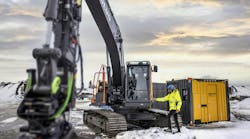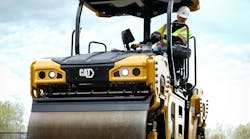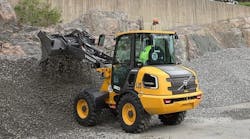Buy a new wheel loader today, and it’s liable to have five or more electronic control modules (ECMs) controlling and recording everything from the fuel injected into the engine’s cylinders to the material lifted by the bucket and everything in between. Technicians require laptops to diagnose many of today’s machine systems, and the machines themselves are able to transmit vast amounts of data back to the manufacturer, dealer and owner via satellite and cellular connections.
Machines can report their location, operating hours, fuel consumption, fuel level, production rates, tire pressure, and literally hundreds of other data points. Using this data, telematics systems can fill your inbox with messages from machines, alerting you to everything from fuel level to fault codes of arguable relevance, from drivers idling too long to those driving too fast. Machine positioning systems that operate with incredible precision via global positioning system (GPS) technology are able to interact with 3D jobsite plans as well as payroll, accounting and inventory systems.
I have met asset managers who claim to be technophobes; unable to use a word processing or spreadsheet program, yet they can text like a teenager on Red Bull. At a recent conference, one salty fleet manager told me, “I don’t know anything about computers: I hired a secretary to do spreadsheets and type letters for me” just minutes before becoming disturbingly excited to receive a text message on his smartphone notifying him that a machine four states away had detected steering movement of the wheels on a motor grader without input from the operator. Fifteen minutes and several phone calls later, he discovered that the machine was operating in muddy conditions and the wheels were turning due to the muddy ruts. There was nothing wrong with the machine, nothing wrong with the way his operator was running the machine, and most importantly, not a darned thing he could do about it.
Some of us embrace every gadget and innovation that comes along, while others resist technology with all the strength they can muster. It is all too easy to get wrapped up in technology for technology’s sake rather than critically evaluating a particular technology as a tool, making judgments based on what it can or cannot do for us. For better or for worse, technology now pervades every aspect of life. We control whether it works to our advantage or overwhelms us with information overload. As asset managers, one of the most important things to realize about technology is that, unless it allows us to manage our fleets more efficiently, effectively, or profitably, it is just another distraction.
Likewise, we must remember that data is not information. Data must be combined and distilled before it becomes information. To paraphrase Dee Hock, the visionary founder of Visa, data in context becomes information. Understanding then transforms collective information into knowledge, which, when shared throughout the organization and combined with experience, becomes wisdom. Information that is not accessible, timely, accurate, and most importantly, actionable is just noise, often worse than no information at all, as bad information leads to poor decisions made with a false sense of security.
Technology today has the potential to provide much of the information and knowledge we need to manage our equipment fleets more efficiently, effectively and profitably. It also has the potential to distract us from our true mission and bog us down in useless data, inane details, and misleading misinformation. Planning and informed decision-making about how, when and to what extent we use technology is the key to achieving the former and avoiding the latter. In future issues of this column, we will look at real-world examples of the promise and pitfalls of technology and provide practical advice on leveraging technology to better manage your fleet.




